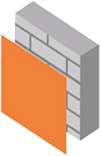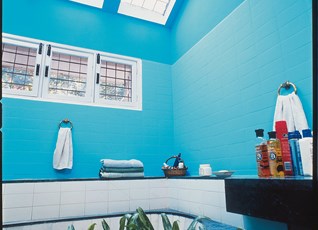Features
See allSurface preparation:
- Ensure adequate ventilation during application and drying
- Do not apply when humidity exceeds 95% and condensation is likely
- Use up to 250 mils of clean water per 3.8L for thinning if necessary for ease of application
- Treat fungal any growth with Berger Sterilizing Solution
Application Procedure:
- By brush, roller or spray. Use clean tools and equipment
- When applying by brush and roller apply an even coat to avoid runs and sags
- Apply 1-2 coats
- Remove any paint drops immediately with clean water
- Allow at least 1 hour drying for Berger Grip & Seal Primer/Sealer
- If the surface is previously painted ensure that dirt, stain etc. and other loose material and contaminants are removed
Tips: For a perfectly smooth surface apply Berger Interior Joint Compound to fill holes, cracks and imperfections.
Tools you will need
Available Packs

1 Coat
9.0 m2/Ltr**
Coverage
On well-prepared surfaces, as per the painting system recommended. Please refer to the Product Data Sheet for surface preparation and method of application.
** Actual coverage may vary from the quoted coverage due to factors such as method and condition of application, surface roughness, and porosity.
Washability
- Best-in-class
- High
- Medium
- Low
Solve Potential Paint Problems
The bubbles or blisters on your walls are called blistering. Paint blisters or bubbles occur when there is loss of adhesion between the paint film and underlying surface.
What are the possible causes?
- Applying oil-based paint over a damp or wet surface
- Moisture seeping through to the exterior surface from an interior source
- Exposure of latex paint film to moisture shortly after the paint has dried, especially in cases of poor surface preparation
What is the solution?
- If blisters do not go all the way down to the substrate, remove by scraping and sanding
- Repaint with premium Berger topcoat for wood or wall
- For interior wood & wall surfaces, Berger recommends Royale
- Blisters all the way down to the surface are a sign of a more significant source of moisture, which must be addressed before any painting can begin
- Once resolved, remove all loose paint and repair any loose caulking
- Allow surface to dry thoroughly before the application of an appropriate primer and a moisture resistant premium topcoat
We recommend you use these painting systems in order of base coat, first coat, and second coat:
Foaming and cratering frequently occur when bubbles form. When the bubbles break during application and drying, they result in small, round concave depressions or cratering.
What are the possible causes?
- Shaking a partially filled can of paint
- Applying paint too rapidly, especially rolling
- Using low-quality paint or very old latex paint
- Using a roller cover with the wrong nap length
- Excessively rolling or brushing the paint
- Applying a gloss or semi-gloss paint over a painted surface
What is the solution?
- All paints will foam to some extent during application
- Premium quality paints are specially formulated, so the bubbles break while the paint is wet, allowing for good flow and appearance
- Avoid excessive rolling or brushing of the paint or using old paint
- Apply gloss and semi-gloss paints with a short nap roller
- Apply appropriate primer/sealer when painting over a porous surface
- Problem areas should be sanded before repainting
We recommend you use these painting systems in order of base coat, first coat, and second coat:
Patchiness generally occurs when insufficient paint has been applied or when paint is applied unevenly, resulting in a variation of the film build leading to patches.
What are the possible causes?
- Inconsistent distribution of paint on the surface
- Incorrect or low quality paint brush or roller
- Failure to apply a primer over joint compound
- Applying paint over joint compound not fully dried
- The top coat is applied over spot-puttied surfaces
- Variations in surface gloss can cause paint to appear patchy
What is the solution?
- Increase the amount of paint on the brush or roller to allow better distribution
- Apply the paint in a grid fashion to ensure an even finish
- Allow puttied wall to dry evenly before priming
- By applying one coat of appropriate premium Berger Primer
- Apply two coats of premium Berger acrylic topcoat
- Refer to Berger Technical Support for primer options
We recommend you use these painting systems in order of base coat, first coat, and second coat:
Picture framing occurs when the brushed areas appear darker than the areas painted with roller, resembling a picture frame.
What are the possible causes?
- Applying paint at different thicknesses in brush and roller application
- Failure to keep a wet edge while painting
- Incomplete mixing resulting in paint not being uniformly incorporated
- Using a roller cover nap that is too long, which will produce a heavy texture
- Using of different techniques in the same area, such as spraying and brushing
What is the solution?
- Ensure similar spread rates with brushes and rollers
- Don't cut in the entire room before roller coating
- Work in smaller sections of the room to maintain a "wet edge"
- Ensure correct colorant-base combinations are used
- Ensure uniform mixing of the paint
We recommend you use these painting systems in order of base coat, first coat, and second coat:
Failure of paint to stick to the surface on which it has been applied and/ or to itself can be described as poor adhesion.
What are the possible causes?
- The biggest cause of poor adhesion is poor surface preparation
- Insufficient sanding before applying any primer
- Applying primer too thin
- Diluting the primer thereby weakening its ability to stick to the surface
- Failure to prime the surface in the first place
- Painting wet or damp surface
- Incompatible coatings, such as a water based coating over oil
What is the solution?
- Use the correct type of primerfor the surface
- Apply primer following manufacturer’s recommendations
- Never paint on a wet or a damp surface
- Always ensure that the area is clean, dry and free from contaminants before painting
- Treat any surface problems before priming
- Ensure that primers and topcoats are compatible and suitable for the surface being painted
We recommend you use these painting systems in order of base coat, first coat, and second coat:
Poor hiding occurs when paint fails to obscure or hide the surface to which it is applied.
What are the possible causes?
- Using low-quality paint with little hiding power
- Spreading paint too thinly or unevenly
- Over-thinning paint beyond the recommended amount
- Failure to prime the surface before top-coating
- Painting a porous or absorbent surface
- Using incorrect or poor quality tools
- Inadequately mixed paint
What is the solution?
- Prime first, if moving from a significantly darker to a light colour
- When painting in a dark colour, tint primer in a similar tone to the topcoat shade
- Use premium quality paint for better hiding and flow
- Use quality and correct tools for the job
- Follow manufacturer's recommendation for thinning
We recommend you use these painting systems in order of base coat, first coat, and second coat:
The easy wearing away of paint when scrubbed with a brush, sponge, or cloth is indicative of a paint which is exhibiting poor scrub resistance.
What are the possible causes?
- Insufficient time allowed for paint to fully dry before washing or scrubbing
- Use of an abrasive cleaner
- Choosing the wrong product or sheen for the area
- Using low quality paint
- Overly aggressively scrubbing the painted area
What is the solution?
- Areas requiring frequent washing will require a high quality paint formulated especially to provide such performance
- High traffic areas may require a silk, semi-gloss or gloss rather than a flat paint
- Allow adequate dry time, as scrub resistance will not fully develop until the paint has thoroughly cured. Typically, 5 days
- Use non-abrasive material and mild detergent where possible
We recommend you use these painting systems in order of base coat, first coat, and second coat:
Failure to resist absorption of dirt and stains, occurs with paint not made specifically to resist dirt and stains.
What are the possible causes?
- A highly porous surface can lead poor stain resistance
- Using of lower quality, flat latex paint
- Applying paint to an un-primed surface
What is the solution?
- Use a paint specifically designed to provide stain and dirt resistance
- Use premium acrylic paint designed for ease of stain removal
- Premium quality acrylic paints contain more binder, preventing stains from penetrating painted surfaces and allow for easy removal
- Priming new surfaces provides maximum film thickness of a premium top coat
We recommend you use these painting systems in order of base coat, first coat, and second coat:
Failure of paint to dry to a smooth film, resulting in unsightly, unintentional brush or roller marks after the paint has dried.
What are the possible causes?
- Re-brushing or re-rolling fresh paint on partially dried paint
- Applying paint too rapidly or for too long
- Using wrong type or poor quality brush, roller or nap size
- Applying too thin of a paint film
- Painting a hot surface or in direct sunlight
- Coating a very porous surface
- Incorrect rolling technique
What is the solution?
- Allow paint to dry thoroughly before applying second coat
- Wait until the paint has dried thoroughly before touching up
- Use correct rolling or brushing technique
- Follow label directions for appropriate quality, applicator size, and type needed
- Follow label directions for correct film build
- Prime to seal porous surfaces
We recommend you use these painting systems in order of base coat, first coat, and second coat:
-
Get Inspiration
-
Make Your Plan

Let us design a project plan to suit your needs.
-
Colour Tools








-can_0715.png?width=134&height=168&mode=crop)












-can_0715.png?width=82&height=102&mode=crop)

